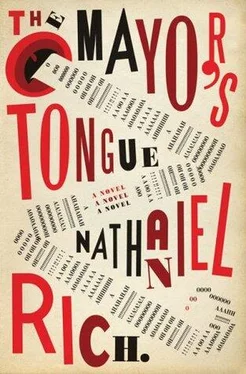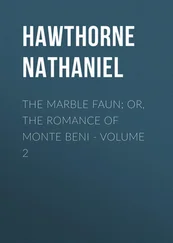Over breakfast the next day — canned peas, mushed, and a glass of condensed milk that Mr. Schmitz delicately tilts down his friend's throat — Mr. Schmitz continues the therapy.
"On a thin peninsula on the Pacific Coast," he begins, "Americans built their most beautiful city on their most treacherous landmass. San Francisco, named after the Christian saint of nature, is a city of forty-two hills. Because of the terrain, each home looks out over the roof of its neighbor. The views extend over a great bay to the east; green hills to the south; the ocean to the west; and to the north, a bridge made of solid gold that leads to another peninsula, reaching out to the first like Adam to his creator in the Sistine Chapel. This land erupts from the ocean in mountain ranges and wild forests populated by the world's tallest trees.
"Since San Franciscans realize that all of this beauty can be snatched from them at any time, and that they could be pulled, along with their hills-houses-views, headfirst into the surf, they cherish their city the way a dying man does the scoop of sky visible outside his hospital window.
"The city is the missing-persons capital of the world. It collects orphans, runaways, discontents, people without pasts. Some of them return to their old existences, with contrived identities and different clothing. But many never leave. They remain there forever, in a perpetually tumultuous state of vibrant life.
"Agnes asked me to take her there to celebrate our thirtieth anniversary. I don't why. Neither of us had been there before. In fact, it had been years since we had traveled anywhere together. You'llremember the week I'm talking about — it was during your eating tour of South America. We left while you were in Buenos Aires and returned before you had left Montevideo.
"When we got to San Francisco we followed the guidebook to Lombard, a crooked street, and then to Vermont, an even more crooked street. We ate Thai food in the Mission District, burritos in Japantown, and Vietnamese food in Chinatown. We visited the locations of old wartime movies: an abandoned military fort, a glowing glass elevator, and most spectacular, the ruins of the world's largest natatorium, perched at the edge of the city where the land abruptly falls off into the ocean.
"It was once a crystal palace, with a glittering glass roof standing high over seven pools, each heated to a different temperature. The structure burned down in the 1950s, but the ruins remained, nestled in a cove between two high cliffs. The largest pool was still filled with water, though it was brackish and littered with garbage. On the steep hill above the ruins there were wild plants and shrubs in all different colors. Agnes taught me the names for wild rose madder, jonquils, and acacia root.
"Hidden in the cliffs behind the pool's ruins, we found a damp cave. Although it was the middle of the day, the cave was pitch-black, lit only by bright white halos of light on either end. The air inside was moist and clingy, and echoed with the sound of the crashing waves. It got very cool in there, about twenty degrees colder than outside. I was in my orange tartan sweater and my trusty old fedora, which I was then in the habit of wearing whenever I left the house — you know the one, Rutherford, you called it my 'weather helmet.'"
To Mr. Schmitz's delight, Rutherford's eyes show a glint of recognition.
"We had been so busy sightseeing that we hadn't spent any time together in silence. But we were quiet in the cave and I could tell that she was ruminating on something difficult. We were watching the waves frothing below us, through a head-shaped hole in the cave wall, and her face was colored with a dim bluish glow. Without ever looking at me, she said, 'That's a beautiful hat you have. You should wear it more often. It makes you look sincere.'
"I wondered if she had become deranged by the miasmic cave fumes. I pointed out to her that I wore the hat every day of my life, put it on as soon as I left the house each morning.
" 'That explains it,' she said. 'That's why I've never seen it before.'
"I didn't understand her then, though I think I do now."
Mr. Schmitz looks at Rutherford, an expression of hope playing across his cheeks. This is the part in the conversation where Mr. Schmitz would normally have relied on a well-timed interruption from Rutherford, distracting him from the pain of confession, but Rutherford offers no help now. His paralytic, tongue-marked face does, however, seem to urge Mr. Schmitz on, encouraging him to reach the conclusion himself. Mr. Schmitz nods reluctantly, and worries at his chin.
"What she was trying to say, I think," continues Mr. Schmitz, "she was trying to say that I was not sincere with her. Or that I didn't spend enough time with her. Or, perhaps. . that she could not recognize in me the man she married."
With a start, Mr. Schmitz notices that Rutherford's mouth has opened slightly. More than that — a drop of sweat is falling down from his brow. Since it is cool in the shadowy house, and Rutherford has no recourse to physical activity, he must have worked very hard — internally — to produce that single bead of perspiration. Mr. Schmitz is elated.
"You're right," he says to Rutherford." I've felt a lot of sadness about that moment, and now I know why."
It has been months since Rutherford forgot how to speak English, over a week since he lost his ability to speak Italian, and several days since he could communicate through the spasms of his brainwaves on the EEG machine, but Mr. Schmitz is now convinced that Rutherford is beginning to recover. When his somatic nervous system failed, Rutherford had somehow learned to rely on his autonomic nervous system. Rutherford, liberated from his hospital confinement, has, after being assailed by who knows what kind of aphasias, strokes, and brain injuries, turned his nervous system into an organ of speech. Mr. Schmitz is overcome by pride for his friend and, as if buffeted by a tremendous gust, has to lean against the wall for several moments in order to right himself.
Days pass, and the two men settle into a routine. Every few mornings, Mr. Schmitz takes the Punto down to Medeazza to stock up on groceries and canned goods. He is greeted with curiosity and suspicion by the grocer in the local market, and is the object of brazen stares in the town square. One young mother hugs her tottering son close to her legs when he passes. A pair of teenage girls point at him and run away, calling him a word he doesn't recognize. Mr. Schmitz is careful not to make eye contact. He feigns ignorance of the Italian language to ensure that, when he is asked why he's traveled so far away from Trieste — not exactly a tourist destination in itself — to this mountain village, he can avoid having to prepare a response. Finally, miraculously, Mr. Schmitz has found a quiet, secluded, and gorgeous retreat where Rutherford can retire. And perhaps, after Mr. Schmitz talks through his life story with Rutherford, he can at last get down to the business of writing his memoir.
There are moments, however, while walking through town, when Mr. Schmitz is hit by a strange urge that vanishes as quickly as it appears, yet leaves a dark impression on him. One such moment comes after Mr. Schmitz has stored his grocery bags in the Punto's small backseat, and is walking around to the driver's side, his keychain dangling from his forefinger. He glances to his left, over the row of blackthorn hedge that lines the road, to the falling hills that end in the curve of the Triestine coast. The clouds passing over the sea seem to inflate and merge with the sea. It's a lonely, foreboding view, and Mr. Schmitz feels sweeping over the terrain, like the wind from the Adriatic, an emotion he can only identify as dread. It pushes him back against the car, until his shoulders press against the driver's-side window. He fears that if he doesn't watch himself, this sensation might push him all the way down the mountain and back to Trieste — back even to Milan and then Manhattan. The desire to leave Rutherford behind, no matter how perverse and slight it might be, scares him badly. Without taking his eyes off of the view, he pulls open the door and falls into the seat. He doesn't dare place the key in the ignition until his heart stops pounding.
Читать дальше












